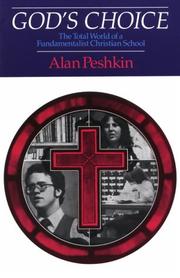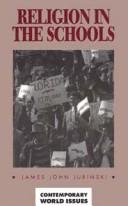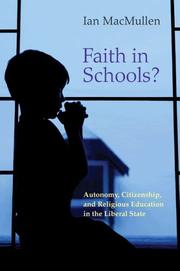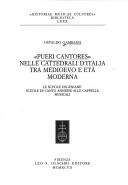| Listing 1 - 10 of 13 | << page >> |
Sort by
|
Book
ISBN: 1742984460 9781742984469 9780980757095 0980757096 9780987178596 0987178598 Year: 2014 Publisher: Melbourne, Australia
Abstract | Keywords | Export | Availability | Bookmark
 Loading...
Loading...Choose an application
- Reference Manager
- EndNote
- RefWorks (Direct export to RefWorks)
Church schools --- Christian schools --- Denominational schools --- Diocesan schools --- Faith-based schools (Church schools) --- Parish schools --- Parochial schools --- Schools, Denominational --- Schools, Parochial --- Church and education --- Private schools
Periodical
Abstract | Keywords | Export | Availability | Bookmark
 Loading...
Loading...Choose an application
- Reference Manager
- EndNote
- RefWorks (Direct export to RefWorks)
Church and education --- Church schools --- École confessionnelle. --- Éducation. --- Religion. --- Christian schools --- Denominational schools --- Diocesan schools --- Faith-based schools (Church schools) --- Parish schools --- Parochial schools --- Schools, Denominational --- Schools, Parochial --- Education and church --- Church and education. --- Church schools. --- Private schools --- Education --- Église et éducation --- Écoles confessionnelles

ISBN: 0226661989 0226661997 Year: 1986 Publisher: Chicago University of Chicago press
Abstract | Keywords | Export | Availability | Bookmark
 Loading...
Loading...Choose an application
- Reference Manager
- EndNote
- RefWorks (Direct export to RefWorks)
#SBIB:316.331H344 --- #SBIB:39A10 --- #SBIB:39A74 --- Church schools --- Fundamentalism --- Christian fundamentalism --- Protestant fundamentalism --- Religious fundamentalism (Protestantism) --- Protestantism --- Theology, Doctrinal --- Evangelicalism --- Millennialism --- Modernist-fundamentalist controversy --- Christian schools --- Denominational schools --- Diocesan schools --- Faith-based schools (Church schools) --- Parish schools --- Parochial schools --- Schools, Denominational --- Schools, Parochial --- Church and education --- Private schools --- Godsdienst en onderwijs --- Antropologie: religie, riten, magie, hekserij --- Etnografie: Amerika --- Case studies. --- History --- Case studies
Book
ISBN: 1282154206 9786612154201 0821379771 0821379763 Year: 2009 Publisher: Washington DC : World Bank/IBRD,
Abstract | Keywords | Export | Availability | Bookmark
 Loading...
Loading...Choose an application
- Reference Manager
- EndNote
- RefWorks (Direct export to RefWorks)
While public-private partnerships in education in the United States have received a lot of attention, research on such partnerships elsewhere has been limited-even though such partnerships have been steadily gaining prominence, particularly in developing countries. Aiming to fill this gap, this book presents fresh, technically sound empirical evidence on the effectiveness and cost of various public-private education partnerships from around the world, including voucher programs and faith-based schools.The evidence on the impact in terms of school performance, targeting, and cost of public-priv
Educational vouchers --- Privatization in education --- Church schools --- Christian schools --- Denominational schools --- Diocesan schools --- Faith-based schools (Church schools) --- Parish schools --- Parochial schools --- Schools, Denominational --- Schools, Parochial --- Privatization of education --- Privatization of schooling --- School privatization --- Education vouchers --- School vouchers --- Vouchers, Educational --- Church and education --- Private schools --- Education --- Charter schools --- Finance

ISBN: 0874368685 Year: 1998 Volume: *8 Publisher: Santa Barbara, Calif. [etc.] ABC-CLIO
Abstract | Keywords | Export | Availability | Bookmark
 Loading...
Loading...Choose an application
- Reference Manager
- EndNote
- RefWorks (Direct export to RefWorks)
#KVHA:American Studies --- #KVHA:Onderwijs; Verenigde Staten --- #KVHA:Godsdienst; Verenigde Staten --- Religion in the public schools --- United States --- Handbooks, manuals, etc. --- Law and legislation --- Religious education --- Church schools --- Ethical education --- Theological education --- Education --- Moral education --- Bible in the schools --- Church and education --- Church and state --- Public schools --- Religious education of children --- Christian schools --- Denominational schools --- Diocesan schools --- Faith-based schools (Church schools) --- Parish schools --- Parochial schools --- Schools, Denominational --- Schools, Parochial --- Private schools --- Handbooks, manuals, etc --- Law and legislation&delete&

ISBN: 9781400828111 1400828112 1282087010 9781282087019 9780691130910 0691130914 9786612935503 6612935502 9786612087011 6612087013 128293550X 0691171386 9781282935501 Year: 2007 Publisher: Princeton, N.J. Princeton University Press
Abstract | Keywords | Export | Availability | Bookmark
 Loading...
Loading...Choose an application
- Reference Manager
- EndNote
- RefWorks (Direct export to RefWorks)
Should a liberal democratic state permit religious schools? Should it fund them? What principles should govern these decisions in a society marked by religious and cultural pluralism? In Faith in Schools?, Ian MacMullen tackles these important questions through both political and educational theory, and he reaches some surprising and provocative conclusions. MacMullen argues that parents' desires to educate their children "in the faith" must not be allowed to deny children the opportunity for ongoing rational reflection about their values. Government should safeguard children's interests in developing as autonomous persons as well as society's interest in the education of an emerging generation of citizens. But, he writes, liberal theory does not support a strict separation of church and state in education policy. MacMullen proposes criteria to distinguish religious schools that satisfy legitimate public interests from those that do not. And he argues forcefully that governments should fund every type of school that they permit, rather than favoring upper-income parents by allowing them to buy their way out of the requirements deemed suitable for children educated at public expense. Drawing on psychological research, he proposes public funding of a broad range of religious primary schools, because they can help lay the foundations for young children's future autonomy. In secondary education, by contrast, even private religious schools ought to be obliged to provide robust exposure to the ideas of other religions, to atheism, and to nonreligious approaches to ethics.
LEGITIMATE PUBLIC INTEREST -- 322 --- USA -- 322 --- SEPARATION OF CHURCH AND STATE -- 322 --- Education and state --- Church and education --- Church schools --- Education --- Education policy --- Educational policy --- State and education --- Social policy --- Endowment of research --- Education and church --- Christian schools --- Denominational schools --- Diocesan schools --- Faith-based schools (Church schools) --- Parish schools --- Parochial schools --- Schools, Denominational --- Schools, Parochial --- Private schools --- Philosophy. --- Government policy. --- Government policy --- Philosophy --- Church schools - Government policy --- Church and education - Philosophy --- Education and state - Philosophy
Book
ISBN: 9781138309173 9781138888487 Year: 2017 Publisher: London Routledge, Taylor and Francis Group
Abstract | Keywords | Export | Availability | Bookmark
 Loading...
Loading...Choose an application
- Reference Manager
- EndNote
- RefWorks (Direct export to RefWorks)
Sociology of religion --- School management --- religie --- scholen --- Europe --- Church schools --- Church and education --- 371.058 --- Education and church --- Education --- Christian schools --- Denominational schools --- Diocesan schools --- Faith-based schools (Church schools) --- Parish schools --- Parochial schools --- Schools, Denominational --- Schools, Parochial --- Private schools --- 371.058 Bijzonder onderwijs. Confessioneel onderwijs. Particulier onderwijs. Vrij onderwijs. Autonome scholen. Neutraal onderwijs. Particuliere scholen --(bestuur en beheer) --- Bijzonder onderwijs. Confessioneel onderwijs. Particulier onderwijs. Vrij onderwijs. Autonome scholen. Neutraal onderwijs. Particuliere scholen --(bestuur en beheer)
Book
ISBN: 0812232461 Year: 1994 Volume: *5 Publisher: Philadelphia (Pa.) : University of Pennsylvania press,
Abstract | Keywords | Export | Availability | Bookmark
 Loading...
Loading...Choose an application
- Reference Manager
- EndNote
- RefWorks (Direct export to RefWorks)
History of civilization --- History of education and educational sciences --- anno 800-1199 --- Europe --- Church schools --- -Education, Medieval --- -Education --- Medieval education --- Seven liberal arts --- Civilization, Medieval --- Learning and scholarship --- Christian schools --- Denominational schools --- Diocesan schools --- Faith-based schools (Church schools) --- Parish schools --- Parochial schools --- Schools, Denominational --- Schools, Parochial --- Church and education --- Private schools --- History --- Social aspects --- -History --- Philosophy --- Education, Medieval --- Historische en vergelijkende pedagogiek --- History. --- Philosophy. --- Historische en vergelijkende pedagogiek. --- Education --- Social aspects&delete& --- Education [Medieval ] --- Education, Medieval - Europe - Philosophy. --- Church schools - Europe - History. --- Education, Medieval - Social aspects - Europe - History.
Book
ISBN: 940178972X 9401789711 1322175292 Year: 2014 Publisher: Dordrecht : Springer Netherlands : Imprint: Springer,
Abstract | Keywords | Export | Availability | Bookmark
 Loading...
Loading...Choose an application
- Reference Manager
- EndNote
- RefWorks (Direct export to RefWorks)
The International Handbook on Learning, Teaching and Leading in Faith-Based Schools is international in scope. It is addressed to policy makers, academics, education professionals and members of the wider community. The book is divided into three sections. (1) The Educational, Historical, Social and Cultural Context, which aims to: Identify the educational, historical, social and cultural bases and contexts for the development of learning, teaching and leadership in faith-based schools across a range of international settings; Consider the current trends, issues and controversies facing the provision and nature of education in faith-based schools; Examine the challenges faced by faith-based schools and their role and responses to current debates concerning science and religion in society and its institutions. (2) The Nature, Aims and Values of Education in Faith-based Schools, which aims to: Identify and explore the distinctive philosophies, characteristics and guiding principles, values, concepts and concerns underpinning learning, teaching and leadership in faith-based schools; Identify and explore ways in which such distinctive philosophies of education challenge and expand different norms and conventions in their surrounding societies and cultures; Examine and explore some of the ways in which different conceptions within and among different religious and faith traditions guide practices in learning, teaching and leadership in various ways. (3) Current Practice and Future Possibilities, which aims to: Provide evidence of current educational practices that might help to inform and shape innovative and successful policies, initiatives and strategies for the development of quality learning, teaching and leadership in faith-based schools; Examine the ways in which the professional learning of teachers and educational leaders in faith-based settings might be articulated and developed; Consider the ways in which coherence and alignment might be achieved between key national priorities in education and the identity, beliefs, and the commitments of faith-based schools; Examine what international experience shows about the place of faith-based schools in culturally rich and diverse communities and the implications of faith-based schooling for societies of the future.
Church schools. --- Church schools --- Administration. --- Christian schools --- Denominational schools --- Diocesan schools --- Faith-based schools (Church schools) --- Parish schools --- Parochial schools --- Schools, Denominational --- Schools, Parochial --- Church and education --- Private schools --- Religion and education. --- Religion and Education. --- International and Comparative Education. --- Administration, Organization and Leadership. --- Learning & Instruction. --- Church and education. --- International education . --- Comparative education. --- School management and organization. --- School administration. --- Learning. --- Instruction. --- Learning process --- Comprehension --- Education --- Administration, Educational --- Educational administration --- Inspection of schools --- Operation policies, School --- Policies, School operation --- School administration --- School inspection --- School operation policies --- School organization --- Schools --- Management --- Organization --- Education, Comparative --- Global education --- Intellectual cooperation --- Internationalism --- Education and church --- Inspection --- Management and organization --- History

ISBN: 8822245474 Year: 1997 Volume: 80 Publisher: Firenze Olschki
Abstract | Keywords | Export | Availability | Bookmark
 Loading...
Loading...Choose an application
- Reference Manager
- EndNote
- RefWorks (Direct export to RefWorks)
Choirboys --- -Church music --- -Church schools --- -Christian schools --- Denominational schools --- Diocesan schools --- Faith-based schools (Church schools) --- Parish schools --- Parochial schools --- Schools, Denominational --- Schools, Parochial --- Church and education --- Private schools --- Church music --- Pastoral music (Sacred) --- Religious music --- Sacred vocal music --- Devotional exercises --- Liturgics --- Music --- Music in churches --- Psalmody --- Choir boys --- Church musicians --- Singers --- Training of --- -History --- Instruction and study --- History --- History and criticism --- Religious aspects --- Christianity --- Eugene IV, Pope --- -Training of --- Church schools --- Christian schools --- Training of&delete& --- Instruction and study&delete& --- Eugene --- Condulmaro, Gabriele, --- Condulmer, Gabriele, --- Eugenio --- Eugenius --- Italy --- 78.41.2 --- 78.23 --- Eugène
| Listing 1 - 10 of 13 | << page >> |
Sort by
|

 Search
Search Feedback
Feedback About UniCat
About UniCat  Help
Help News
News